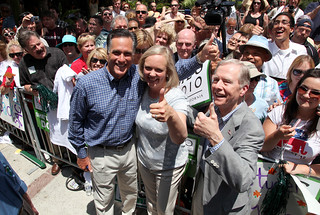By Krista Collard
Having to choose between going to work to keep food on the table for your family and neglecting your health or the needs of sick child is not a choice people should have to make. But every day, over 5 million working Californians who lack access to paid sick days, have this unfair choice hanging over their heads.
Like most people, we believe that anyone who is willing to work full-time should not be forced to live in poverty. We also agree with most people that if a worker or their child gets sick, it’s better for everyone if that worker is able to take some earned leave to get well without losing critical pay or worse, their job. That’s why we’ve launched our petition” in support of AB 1522, a bill that would guaranteed three paid sick days a year for every California worker after 90 days of employment.
Working mothers are among the most likely to need paid sick days-women remain the primary caregivers for children, the elderly, and the disabled, and are more likely than fathers to need to stay home with a sick family member. Yet many working moms are employed in the retail and restaurant industries, and aren’t offered any paid time off when illness strikes. This creates a serious problem not only for workers, but for consumers as well when those workers are offered no choice but to serve food or stock shelves while ill.
Having to choose between going to work to keep food on the table for your family and neglecting your health or the needs of sick child is not a choice people should have to make. But every day, over 5 million working Californians who lack access to paid sick days, have this unfair choice hanging over their heads.
Like most people, we believe that anyone who is willing to work full-time should not be forced to live in poverty. We also agree with most people that if a worker or their child gets sick, it’s better for everyone if that worker is able to take some earned leave to get well without losing critical pay or worse, their job. That’s why we’ve launched our petition in support of AB 1522, a bill that would guaranteed three paid sick days a year for every California worker after 90 days of employment.
Working mothers are among the most likely to need paid sick days-women remain the primary caregivers for children, the elderly, and the disabled, and are more likely than fathers to need to stay home with a sick family member. Yet many working moms are employed in the retail and restaurant industries, and aren’t offered any paid time off when illness strikes. This creates a serious problem not only for workers, but for consumers as well when those workers are offered no choice but to serve food or stock shelves while ill.
Andrina Garcia is a good example of this pervasive problem. A single mother of two small children and worker in the fast-food industry, she doesn’t have access to a single sick day. So if she, her children or anyone else she helps to take care of becomes ill, she still has to make tacos or face losing wages.
Garcia said:
“As a single mother working for a large fast-food company making only $8.05 an hour, it is really challenging to provide for my children, but I do the best I can.
“Recently my mother got sick and I had to rush her to the hospital. Fortunately, it happened after my shift was over because otherwise I don’t know what I would done. Having a few sick days as a safety net –days that I’ve worked hard to earn– could make a huge difference to me and my family.”
A research brief prepared by Next Generation shows that only 61 percent of Americans working in the private sector receive paid sick leave. Those with greater access to paid sick leave tend to be full-time and high-wage workers; White, black, and Asian non-Hispanic workers are also more likely than Hispanic workers to have access.
According to polls, 85 percent of Californians support paid sick days legislation. In San Francisco, city-wide Paid Sick Days legislation enacted in 2007 has shown continued support, including from business owners. If AB 1522 passes, California would be the second state to pass such a law.
So please sign join us in supporting AB 1522, a landmark California bill to provide EVERY worker with paid sick days. It will provide critical support to millions of working Californians who have worked hard to earn the sick time they deserve. Sign the petition today!
 Former governor worries at message he would send to voters
Former governor worries at message he would send to voters

